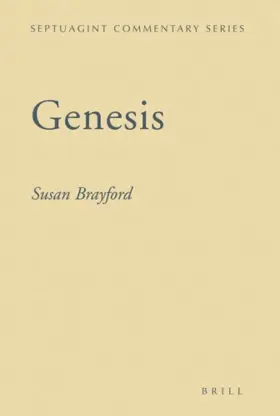

Genesis
in Brill Septuagint Commentary Series
Pages
470 pages
Publisher
Brill
Published
2007
ISBN-13
9789004155527
The Septuagint (LXX) of Genesis allowed Greek-speaking Jews in the last centuries BCE to read their sacred stories in their new lingua franca. The Hellenistic influence on this Greek translation of Genesis at times subtly altered the manner in which Jews – and later Christians – understood the origins of the world and the relationships within and outside the first family of Israel. Because the LXX was the Bible of the early Christian Church, it had more influence on Christian thought than the earlier Hebrew version. LXX Genesis: A Commentary, based on the Greek text of Codex Alexandrinus, offers the first English language commentary on one of the most significant books of Tanak and the Christian Bible.
Collections
This book appears in the following featured collections.
- Commentaries by Female Scholars by John Dyer
Reviews
Leiden: Brill, 2007. Pp. viii + 468. Cloth. $264.00. ISBN 900415552X. Jan Joosten Université Marc Bloch Strasbourg, France This is the fourth volume to appear in the Septuagint Commentary Series, directed by S. E. Porter, R. S. Hess, and J. Jarick, after A. G. Auld’s Joshua (2005), N. C. Croy’s 3 Maccabees (2006), and D. deSilva’s 4 Maccabees (2006). The originality of the project is to propose an analysis based on one specific manuscript and not, as in other recent projects on the Septuagint, on an eclectic edition. In the present case Codex Alexandrinus has been chosen, since both Codex Vaticanus and Codex Sinaiticus are deficient in large parts of Genesis. The volume contains a short introduction to the Septuagint and its investigation in recent times (1–29); an edition of Codex Alexandrinus of Genesis (passages that are missing in Alexandrinus are supplied from Cottonianus) with English translation on facing pages (32–201); and a running commentary on the Greek and Hebrew texts (205–452); and a bibliography and indexes. The Greek text of Codex Alexandrinus (henceforth A) follows that of Swete’s edition of 1887. Apparently, no photographs or facsimiles were used. As is explained on page 24, an electronic text based on Rahlfs’s critical edition was modified so as to make it conform to Swete’s text. This is a convenient way to produce a printed text in the age of computer technology, but it is not a very sure method to provide an accurate edition of the text.
[Full Review]
